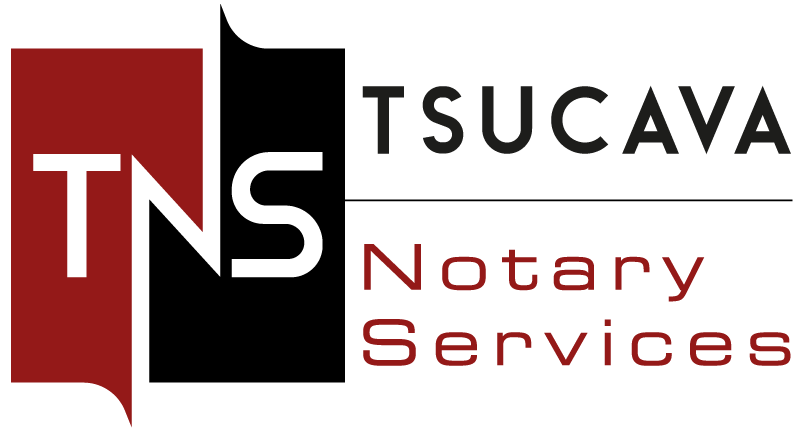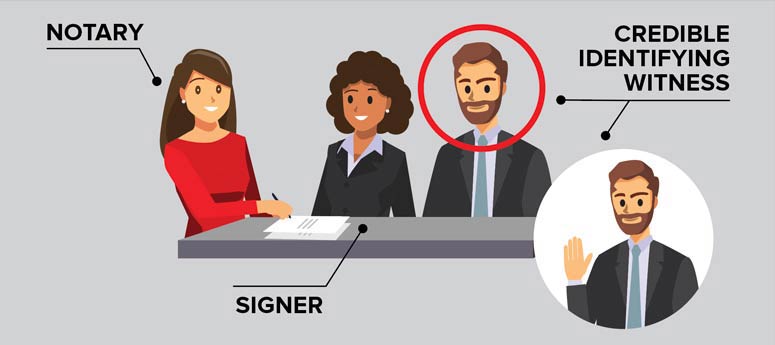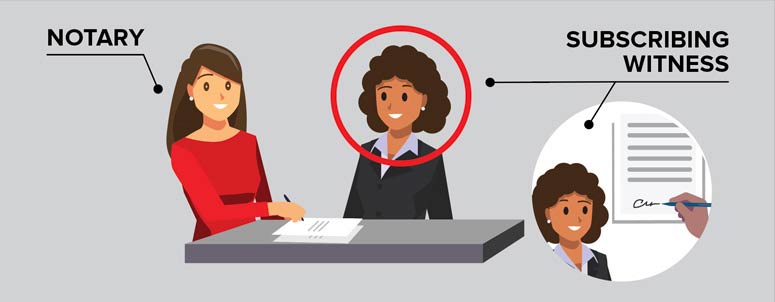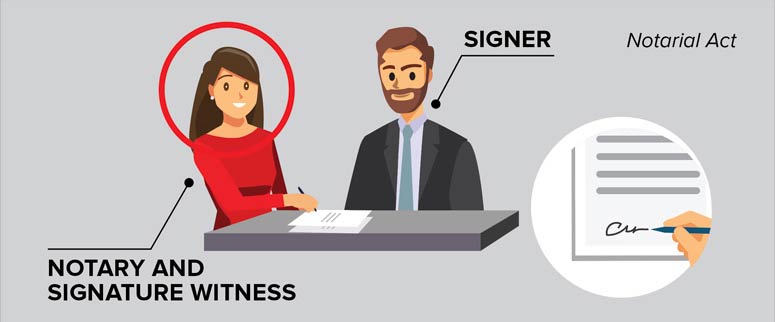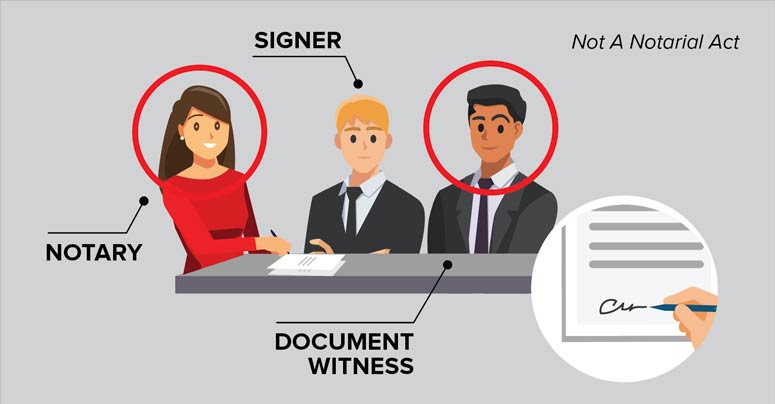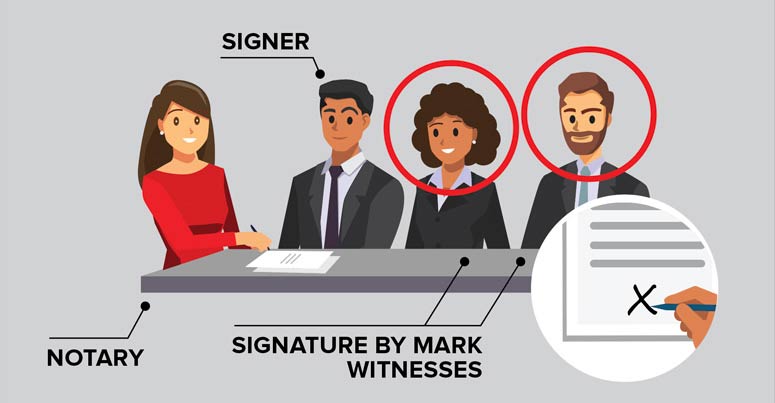
The term “witness” has different meanings when it comes to notarization. Sometimes it means a customer wants the Notary to serve as some type of witness. It may mean the signer needs a witness to verify their identity. And sometimes it means a signer wants the Notary to perform a request that is completely outside the Notary’s official duties!
To help clear up confusion, here’s a list of different kinds of witnesses and witnessing Notaries are commonly asked about, along with an explanation of each one.
Credible Identifying Witness
What is a Credible Identifying Witness?
A credible identifying witness is a person who vouches for the identity of a signer.
Who can serve as a credible identifying witness?
A credible identifying witness must personally know the signer. In some states, the witness must also know the Notary personally, or the witness must present an ID to the Notary.
What is a Credible Identifying Witness?
A credible identifying witness is a person who vouches for the identity of a signer. Essentially, a credible identifying witness serves as a human ID card.
Who can serve as a credible identifying witness?
A credible identifying witness must personally know the signer. In some states, the witness must also know the Notary personally, or the witness must present an ID to the Notary.
Several states, including California, Florida, Nebraska and North Carolina, do not allow persons to serve as credible identifying witnesses if they have an interest in or benefit from the document being notarized.
For more information, please see “Notary Essentials: Using Credible Identifying Witnesses.”
Subscribing Witness
What is a Subscribing Witness?
A witness who watches the signing of a document, and who then appears before the Notary in the principal signer’s place.
Who can serve as a subscribing witness?
To serve as a subscribing witness, a person must either have been physically present when the document was originally signed or present for the signer to acknowledge their signature to the witness.
Because of the high potential risk of fraud when using a subscribing witness, some states prohibit their use on certain documents.
What is a Subscribing Witness?
If a document signer is unable to personally appear before a Notary to acknowledge their signature on a document, some states allow a “subscribing witness” to watch the signer sign the document or take the signer’s acknowledgment and appear in the principal signer’s place for the notarization. This is known as “proof of execution by subscribing witness.”
Who can serve as a subscribing witness?
To serve as a subscribing witness, a person must either have been physically present when the document was originally signed or present for the signer to acknowledge their signature to the witness.
Because of the high potential risk of fraud when using a subscribing witness, some states prohibit their use on certain documents. For example, California does not allow proofs of execution by subscribing witness when notarizing any instrument affecting real property. Some states prohibit all use of proofs of execution by subscribing witness. Always check your state laws before agreeing to notarize for a subscribing witness.
For more information, please see “Best Practices Regarding Subscribing Witnesses.”
Signature Witnessing
What is Signature Witnessing?
A signature witnessing is an official notarial act, though not allowed in all states. To perform a signature witnessing, the Notary must have the signer personally appear and provide satisfactory proof of identity. The signer must then sign the document in the Notary’s presence.
Who can perform a signature witnessing?
A Notary or other officer authorized to perform notarial acts can perform a signature witnessing in the states that allow it.
What is Signature Witnessing?
A signature witnessing is a type of notarial act authorized in many states, including Colorado and Pennsylvania. To perform a signature witnessing, the Notary must have the signer personally appear and provide satisfactory proof of identity. The signer must then sign the document in the Notary’s presence, and the Notary then completes the appropriate notarial wording.
It is very important to be aware that a signature witnessing is NOT the same as an acknowledgment or jurat, though the acts are similar in some aspects. A signature witnessing is different from an acknowledgment in that it requires the document to be signed in the Notary’s presence. A signature witnessing is also different from a jurat, because while with both acts the document must be signed in the Notary’s presence, a signature witnessing does not require the Notary to administer an oath or affirmation to the signer. Not all states authorize their Notaries to perform signature witnessings. For more information, please see the article and video “3 Differences Between Acknowledgments And Signature Witnessings.”
Also, a signature witnessing is an official notarial act, and is NOT the same as a Notary being asked to witness a document in a non-Notary capacity (see “Document Witness Requests” below).
Who can perform a signature witnessing?
A Notary or other officer authorized to perform notarial acts can perform a signature witnessing in the states that allow it.
Document Witness Requests
What is a Document Witness Request?
Sometimes when notarizing a document, a Notary or other individual will also be asked to serve as a document witness. Acting as a document witness is not an official notarial act. The Notary acts as a private individual to witness someone signing the document, in addition to officially notarizing.
Are Notaries allowed to serve as document witnesses while also notarizing?
Only in some states, and under certain conditions.
What is a Document Witness Request?
Sometimes when notarizing a document, a Notary or other individual will also be asked to serve as a document witness. Acting as a document witness is not an official notarial act. The Notary is being asked as a private individual to witness someone signing the document, in addition to officially notarizing one or more signatures on the document.
Are Notaries allowed to serve as document witnesses while also notarizing?
Only in some states, and under certain conditions. For example, Florida and South Carolina allow Notaries to also serve as document witnesses, but Georgia and Kansas do not.
Also, If you are asked to sign a document as a private witness, it may create a conflict of interest if you are also asked to officially notarize other signatures on the same document.
In states that don’t provide specific rules, like California and Texas, the safest course is for Notaries to turn down requests to notarize and also act as private document witnesses on the same document.
Signature By Mark Witnesses
What is a signature by mark?
A signature by mark is when a signer who is unable to write their name signs a document using a mark such as “X” instead, and has the mark notarized. Several states require one or more witnesses to be present when the signer makes the mark.
Who can serve as a witness to a signature by mark?
It depends on your state’s Notary laws. Some states require witnesses to have no interest in the document being notarized. Michigan and Ohio allow the Notary to serve as witnesses to a signature by mark.
What is a signature by mark?
A signature by mark is when a signer who is unable to write their name signs a document using a mark such as “X” instead and has the mark notarized. Several states require one or more witnesses to be present when the signer makes the mark, and it’s a common practice to have one of the witnesses print the signer’s name next to the mark.
Who can serve as a witness to a signature by mark?
This depends on your state’s Notary laws. For example, Arkansas requires a single witness with no interest in the document, but Florida requires two disinterested witnesses. Always be sure you have met any state requirements for witnesses before notarizing a signature by mark. See this article about signatures by mark for more information.
Author: Davis Thun | Article Source: https://www.nationalnotary.org/notary-bulletin/blog/2021/04/different-types-of-witnesses-and-witnessing-notaries
